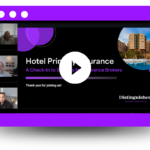Maximizing Hotel Business Interruption Insurance
An important part of a robust disaster plan for hotels and resorts is business interruption insurance. This coverage is essential in covering the loss of income suffered by a business after a disaster. Hotel business interruption insurance provides funds to make up the difference between the operation’s normal income and its income during and immediately after a forced shutdown because of a covered loss, such as a fire. It covers the revenue you would have earned, based on your financial records, if the disaster had not occurred. The policy also covers fixed operating expenses, such as electricity, taxes, and mortgage payments, which continue even though business activities have come to a temporary halt.
Several factors are important when determining the ins and outs of a hotel’s business interruption policy to maximize coverage, including:
- Make sure the policy limit kicks in for a sufficient number of days. Depending on the type of disaster and resulting damage, it can take a significant amount of time to get a hotel back on track.
- Establish objective, verifiable support for loss of net income. Minimize the risk of a payment dispute with numbers that can be verified back to their sources, such as a general ledger, financial statements, tax return, etc. Examples of objective support include damage and restoration reports by independent engineers and contractors, both pending and in-force contracts, and reservations from the prior few years.
- Be sure coverage will apply for partial suspension of operations – not just if there is a total operational shutdown. Business interruption insurance is meant to put the business back into the same financial position it would have occupied had the incident not occurred.
- If the timeline for rebuilding is affected by events outside the hotel’s control, such as construction delays, or a longer than expected permitting process, advance notice should be provided to the insurance company and the insured should document the source of the delay. This will help prevent benefits from being suspended because length of rebuilding is found to be unreasonable.
- Consider including an Extended Period of Indemnity in the business interruption insurance policy because, when a hotel operation does resume operations, it may not be bringing in the same revenue and net income that it previously did. A hotel can be operational but still suffering a loss from the disaster, so having an Extended Period of Indemnity can help make up the difference.
- Request in writing any additional documents the insurance company may need to assess the amount of the claim. This helps to avoid potential disputes over whether the documentation provided is adequate.
In addition, Cyber insurance policies should be secured to cover business interruption expenses associated with Internet-related losses.
To learn more about insurance for your hospitality accounts, visit Distinguished Specialty.




